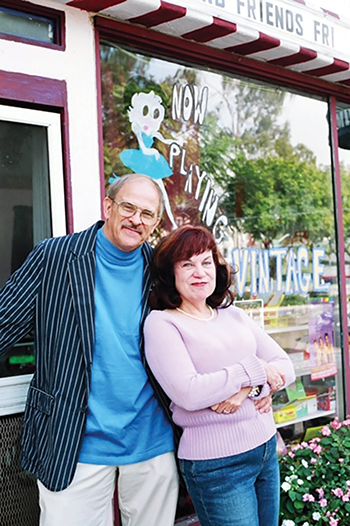Myelofibrosis Survivor
Couple Takes A Team Approach To Living With Cancer
 Though diagnosed with myelofibrosis, a rare bone marrow cancer, Summer Golden didn’t let the disease stop her. A creative person trained in theater and comedy, she channeled her talents into a stand-up comedy routine, which she performs for support groups and on YouTube. She and her husband Jeff Bushnell are strong advocates for others with myelofibrosis.
Though diagnosed with myelofibrosis, a rare bone marrow cancer, Summer Golden didn’t let the disease stop her. A creative person trained in theater and comedy, she channeled her talents into a stand-up comedy routine, which she performs for support groups and on YouTube. She and her husband Jeff Bushnell are strong advocates for others with myelofibrosis.
On December 31, 2017, a knock on my door at 3 a.m. by EMTs and the police was my first indication something was wrong. My doctor had called in a welfare check because a blood test for an unrelated issue alarmed her,” Summer said. “The EMTs said my appendix was about to burst, which is odd because I’d had it removed a long time ago. I wondered if it was possible for an appendix to grow back.
“I’m not sure why the EMTs were worried about my appendix because once I arrived at the ER, the doctor said my blood contained too many white blood cells and looked like it had leukemia,” she said. “He contacted the oncologist on call who just happened to specialize in myeloid diseases. I was incredibly lucky I went to the hospital that night.”
The oncologist ordered more blood tests, a CT and a bone marrow biopsy. Sent home to anxiously wait for results, Summer and her husband Jeff, a retired military pilot, worried what the tests would show. It took a month for the oncologist to confirm it was myelofibrosis and tell her she had three years to live. That initial prognosis was based on the median of studies of myelofibrosis patients at the time. But fast-moving research, better stem cell transplant procedures and numerous experimental treatments have raised the median life expectancy since Summer was diagnosed.
“I had never even heard of this disease and knew nothing about it,” Summer admitted. “I was pretty scared, but my doctor was able to explain everything so I could understand it. She was very reassuring. Hearing you have three years to live is shocking, but her honesty made me feel I could always trust her. That bond is so important.”
The oncologist also built a bond with Jeff, who wanted more details about the disease.
“Summer’s diagnosis hit like a ton of bricks,” Jeff said. “I was shocked and terrified, but when we met her oncologist, I felt like I could take a breath. She addressed each of our concerns, which made us feel comfortable. Summer was worried about how the disease would impact her life. I am more analytical because of my pilot training. I wanted to learn as much about myelofibrosis as possible. Knowledge is power. So, Summer and I took a team approach to this disease. Summer focused on her mental attitude while I concentrated on the medical information. Together, we make a strong team!”
A stem cell transplant is the only curative treatment for myelofibrosis, and Summer was concerned the process was too risky. She admits she may have considered the option if she’d been younger. Instead she chose to start treatment with a kinase inhi- bitor and has beaten the odds she was originally given. This medi- cation has improved her blood counts, and she expects she has many years ahead.
“At first, the side effects were difficult,” Summer said. “I felt sharp pins in my head and back, then dizziness and leg cramps. Slowly, these lessened the longer I took the medicine. Now, I only have leg cramps every once in a while.”
She remains on the targeted therapy, which she knows will eventually stop working. Her doctor said there is another drug she can switch to when that happens. Meanwhile, she has blood tests every month and sees the doctor every three months.
“When I was diagnosed, I only told a few people, so Jeff was my primary support,” she said.
As Jeff researched the disease, he found information for survivors and caregivers on a myelofibrosis support group on Facebook.
“Finding that group was a godsend,” he said. “I also found support through the Leukemia & Lymphoma Society, the MPN Research Foundation and the Patient Empowerment Network (PEN).” Summer and Jeff are now both involved with the PEN, offering their knowledge and experience to others with the same diagnosis.
“Today, we create new YouTube videos addressing common questions and concerns of people with myelofibrosis,” Summer said.
Summer’s attitude helps her face her condition.
“I used my experience in theater and comedy to write a comedy routine about my experiences,” she said. “Using comedy lifted my spirits and helped me process what was happening in a creative way. How I think about cancer is the key. I believe in setting goals, creating vision boards and maintaining an active interest in life. One of my goals became sharing the routine with support groups and others with myelofibrosis. I’ve performed it for several groups, Rotary clubs and for the myelofibrosis Facebook group.”
While Summer used her creative talents to reach out to others, Jeff sought support to be the best caregiver he could be.
“As a caregiver, you need to meet your loved one where they are regardless of whether they show symptoms,” Jeff said. “It’s important that you listen very closely to them and provide what they need. This is a difficult cancer to cure and everyone responds differently, so each person’s needs will vary. But there is support!”
“My philosophy is nobody has more than this moment,” Summer said. “Set goals, accomplish them and do the things you want to do. Keep living!”


